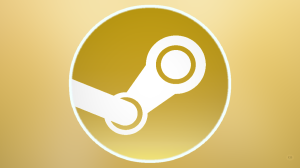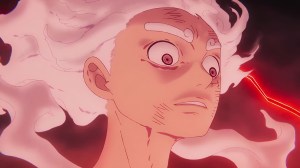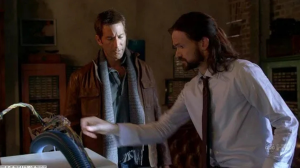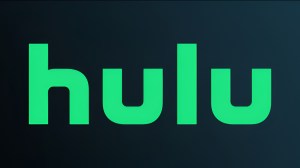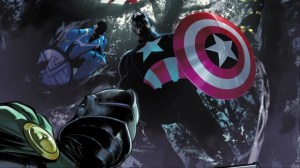Earlier this week, “internet music superstar” and Code Monkey Save World co-creator Jonathan Coulton released his latest album, Solid State, along with a graphic novel that he plotted for writer Matt Fraction and artist Albert Monteys.
Videos by ComicBook.com

While Coulton’s music often explores similar themes time and time again, Solid State is his first attempt at an actual concept album — and the over-arching themes and stories that he was working with helped to inform Fraction and Monteys’ graphic novel companion of the same name.
Image Comics has solicited the graphic novel alone for sale in July, and Solid State as an album was released yesterday — but you can order both, as well as records, t-shirts, signed comics, and more, on Coulton’s website.
Coulton joined ComicBook.com to talk about the project, its origins, and working with Fraction and Monteys.
How did you end up hooking up with Matt Fraction for this new project?
When Greg [Pak] and I did Code Monkey Save World, that just came out of a conversation we were having on Twitter. He said, “Your characters would make a great team of supervillains,” and we were like “That’s actually a great idea.”
But I’d known Greg since college. Matt, I had read Sex Criminals and really loved it. We had Matt on the JoCo Cruise one year — I guess that’s where I first met him in person, and of course Kelly Sue [DeConnick] came along as well. I got to hang out with both of them and their kids a little bit, and it was after that, that I said I had been hatching the idea of trying to do a graphic novel and figure out how that would work and who I would need to work with for it. I realized that Matt would be perfect for it, so I sort of screwed up my courage and asked him, and was delighted that he said yes.
The culture of your music feels very at home with the comics community. Was that something you were always interested in, and it took Greg tweeting his way into it to make it happen?
I had thought of it — it’s funny, being a nerd means so many different things to different people. Where I grew up in rural Connecticut, there was no comic book shops. There wasn’t really a comics scene, and I didn’t know anybody who was into them, so I kind of missed that boat completely when I was growing up. It’s one of those things that feels like a weird hole — you meet somebody who’s a nerd and they’ve never seen Star Wars or something like that: “What happened?”
So it wasn’t really a huge part of my life growing up, but it certainly had occurred to me that obviously I write songs that are science fiction-oriented or superhero-oriented, not explicitly but the same kind of storytelling, I think, that happens in comics and graphic novels.
So it does feel like a natural fit and it had occurred to me, but it’s one of those things where I feel pretty competent in terms of playing a guitar and writing a song, but when it comes to putting a larger story together in the medium of a book or graphic novel, that’s not my expertise. It’s a daunting thing to think about taking what you do and putting it in a different medium. That’s one of the reasons it was so great working with Greg: I already knew him and loved his work as well. It was a nice way of getting into it; he was somebody I could trust, and work with.
I agree that there’s a kind of overlap. It’s the same kind of storytelling.
2
With Solid State, it’s a little bit different because you’ve got a concept album that tonally meshes well with the graphic novel; was it something that you worked with Fraction as you were writing the music?
The concept kind of evolved as I was writing the record. I didn’t set out to write a concept album, and once I was about halfway through, some scenes kept coming up and there were some voices that were the same across multiple songs and my producer suggested taking the title track — “Solid State” — and doing a reprise of it at the end of the album — and then it kind of felt like “Alright, so there’s an arc in the middle of the album. What happens in that arc, and what does it have so far?” I sort of fleshed it out from there.
So by the time I had finished the album, I had an outline that, song by song, went through what I was thinking of when I wrote those songs and how I thought they fit into a kind of narrative. Even though the songs themselves are not particularly explicit about what’s going on — it’s not like there’s a character’s name ever, and it’s not like “this happened and then this happened.” It is very oblique, and I think that if you just listen to the album and were not told that there’s a concept, I’m not certain you would pick up. I’m certain that you would not pick up all of the details that I am imagining, and you might not even pick up that there’s an arc there.
I handed that outline to Matt, and it was kind of sketchy and had some very heady concepts about artificial intelligence and people learning how to be more empathetic, and anytime I would describe it to somebody, I would feel like a crazy person. It was this very bombastic, sprawling story about the future of humanity and our relationship to technology, and it definitely felt like I was biting off more than I could chew. When I handed that outline to Matt, part of me expected that he was going to run screaming, so when he said, “No, this sounds cool, I like it,” I was delighted.
He would write a bunch of pages and send them to me as he was going. We would talk about it here and there, and he would make some key tweaks here and there. Really, just right away he nailed the tone that I was looking for, and he was able ot build this scaffold of more detailed storytelling around the emotional arc that I was trying to describe in my outline. He really nailed it, and as the pages came in and I saw the story unfold, I was like, “Yeah, this is really it. This is the story I wished it was going to be.”
3
In your work, I feel like a lot of your songs deal with empathy — and right now, culturally and politically, we’re dealing with a culture where technology and social media seem to be attacking empathy. Is it weird to be looking at the positives of technology right now?
Yeah. It’s funny: I started writing this album as a way of expressing my own disillusionment with the internet and internet culture, and with the way we were incorporating this technology into our lives as humans. In the first few years of this century, I was really optimistic and enthusiastic and I felt like, “Oh, great, here it is. Technology is here to save us and fix us.”
More recently, I’ve been feeling this letdown as it’s become clear that technology is here, but it’s really just heightening who we are as people and sometimes, that’s not so great because sometimes we’re awful.
So it’s been kind of a painful awakening, and in writing this, this was before Trump had happened when I was writing most of this. So as I was writing it, I was trying to find my way to optimism again. I still do believe that what we’re experiencing is a painful but necessary change in who we are, that is brought about by this technology, which is allowing us to connect with each other and share ideas and speak our minds and learn about each other…and it really sucks right now. It just really hurts: It’s this really powerful tool that we haven’t yet learned how to use. We haven’t reached the point of understanding one another and accepting one another; we’re still angry, terrified cave people in many ways.
So the fact that it suddenly feels like it has this additional cultural and political relevance is strange and unexpected, and it almost feels naive to still be saying at this point that I believe that this technological and cultural change is ultimately going to be good for us, because for many people right now, including for me, it feels like a pretty hard time. I hope that we figure it out and I hope that what we’re experiencing now is a learning process. As we know, a learning process is often a painful thing, but it is what you need to move forward and change.
Is the other side of that coin is the JoCo Cruises, which seem like they’re kind of intimate and visceral and almost the opposite of the internet?
Yeah. The JoCo Cruise has become a real place of comfort and community for me, and I think for a lot of people. It’s this annual thing and it was such a lark and such a ridiculous thing: “Let’s get together and have a cruise every year!” But it has turned into this amazing community of people — and yeah, it is kind of anti-internet. We’re on this ship and the internet connectivity is not great, and in some cases doesn’t work at all because there’s so many of us.
To be physically together in this community of people that is really mutually supportive and friendly and welcoming and understanding, it’s the branch of nerdery that is really accepting, as opposed to the branch of nerdery that’s really exclusive. In that way, it feels very good to be a part of that thing because it does feel like an antidote to the kind of tribalism that happens when you’re online and you forget that you’re connecting with humans. It’s an event where humans are together in a space, doing things with other humans, which is a rarer and rarer thing these days.
In particular this year it was a real tonic to have people come together and share in that spirit of acceptance and mutual support and just celebrating the stuff that we like and discovering new things that we didn’t even know we liked. It’s great; it’s really fun.
4
You said you didn’t set out to make a concept album, but the kind of aural fingerprint of this album feels very much of a piece. Was that a happy accident or did you do some tweaking once you figured out that you were making a concept album?
A lot of that is, the way I was writing. I felt a little stalled with writing on guitar, so I did a lot of writing on the computer. Turning knobs and starting with sounds and starting with loops and building a chord structure on top of that rather than starting by writing on guitar, which is how I normally write.
I think it did lead to…there are a few of those songs that are a lot less harmonically complex. People always yell at me because I have too many chords in my songs, and I think one of the side effects of working the way I did and writing the way I did is that a lot of these songs are harmonically more simple than they otherwise would be — which meant that there was a lot more room to play with melody and with soundscape and with harmonies.
I would say part of the glue that holds it all together is my producer Christian Cassan, who has been my drummer for the last couple of years and who is a great musician and guitarist and bass player as well. He plays a lot on this album, and so much of his work is on it. It does have this — I think you’re right, this aural fingerprint that spreads through the record. But we did pick a couple of moments where we said “here’s a little musical theme that can come up again later,” and “here’s a little piece we can reuse in this spot and this spot.”
I think we tried to be aware of the palette we were using and use that same palette across the whole record. For instance, the bridge of “All This Time” is the same as the bridge in “Sunshine.” They’re in different keys, but it’s the same chords and the same melody, and that was my attempt to describe a similar epiphany happening to two different characters in two different timelines.
So there were things like that where we consciously said, “Yeah, let’s take this little Easter egg in there,” and I think that’s part of it, but I have to give a lot of credit to Christian for that because he thought a lot about that as we were working, and pushed that a lot.


